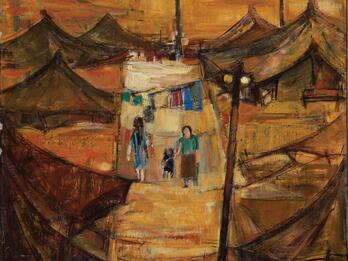Hope against Hope: A Memoir
Nadezhda Mandelstam
1970
The death of an artist is never a random event, but a last act of creation that seems to illuminate the whole of his life under a powerful ray of light. [ . . . ] Why are people surprised when poets are able to foretell their own fate with such insight and know before hand the manner of their death? It is only natural, after all, that death, the…
Related Guide
Jewish Culture in Postwar Europe
As European Jewish communities tried to rebuild after the Holocaust, they faced new challenges and forged identities distinct from those in Israel and the United States.

Related Guide
Postwar Jewish Life Writing
Life writing in the postwar period explored the Holocaust, displacement and migration, cultural identity, and the deteriorating situation of Jews behind the Iron Curtain.
Creator Bio
Nadezhda Mandelstam
Nadezhda Mandelstam was born Nadezhda Khazina in Saratov, Russia, to a middle-class professional family; her mother was one of the first female doctors certified in Russia, and her father was an attorney. She spent her formative years in Kiev, where she met poet Osip Mandelstam. They were married in 1922. In 1934, after Osip read from a satirical poem about Stalin, he was sentenced to the gulag. Nadezhda joined him. In May 1938, Osip was arrested again and died. Nadezhda spent the next twenty-eight years wandering throughout Russia’s provincial towns to avoid arrest, teaching English. In 1964, she was allowed to live in Moscow, where she completed her dissertation in linguistics. Mandelstam committed her husband’s poems to memory in the hope that someday she would be able to publish them, a goal that she ultimately achieved. The focus of her memoir Hope against Hope, a masterpiece in its own right, is on the terrible last years of the poet.


